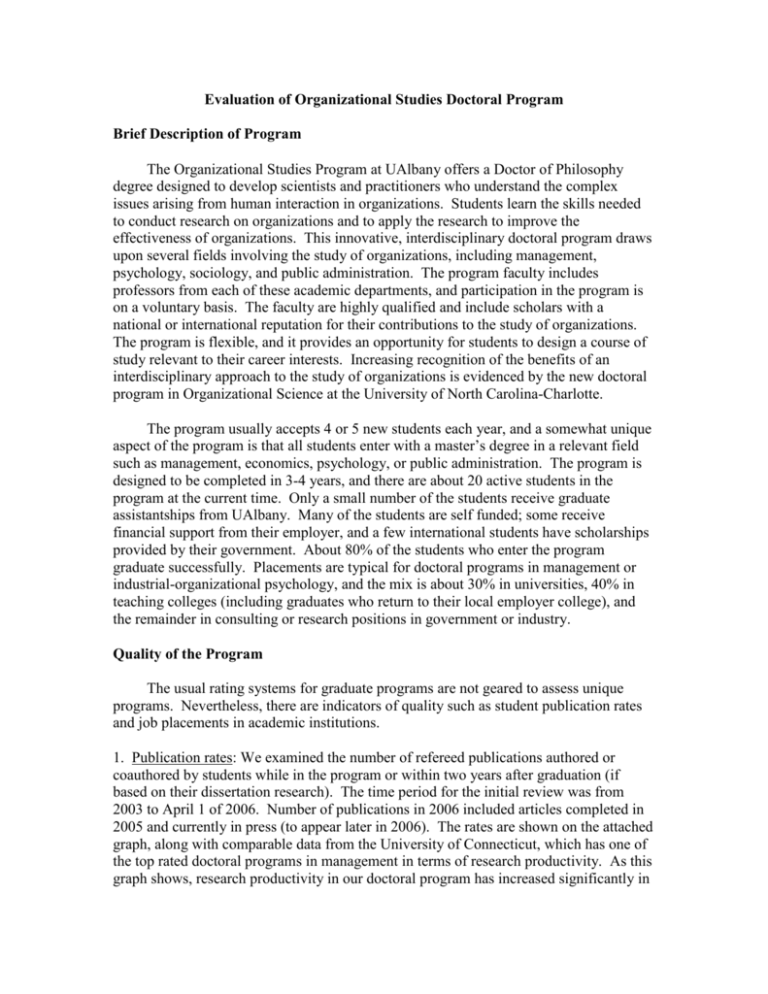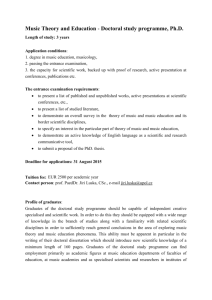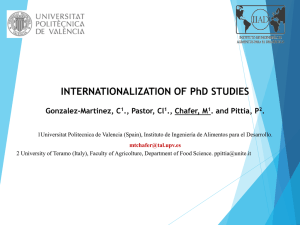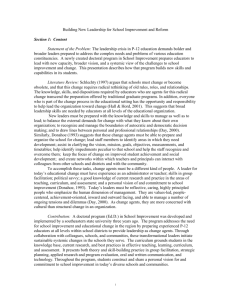Evaluation of OS PhD - University at Albany
advertisement

Evaluation of Organizational Studies Doctoral Program Brief Description of Program The Organizational Studies Program at UAlbany offers a Doctor of Philosophy degree designed to develop scientists and practitioners who understand the complex issues arising from human interaction in organizations. Students learn the skills needed to conduct research on organizations and to apply the research to improve the effectiveness of organizations. This innovative, interdisciplinary doctoral program draws upon several fields involving the study of organizations, including management, psychology, sociology, and public administration. The program faculty includes professors from each of these academic departments, and participation in the program is on a voluntary basis. The faculty are highly qualified and include scholars with a national or international reputation for their contributions to the study of organizations. The program is flexible, and it provides an opportunity for students to design a course of study relevant to their career interests. Increasing recognition of the benefits of an interdisciplinary approach to the study of organizations is evidenced by the new doctoral program in Organizational Science at the University of North Carolina-Charlotte. The program usually accepts 4 or 5 new students each year, and a somewhat unique aspect of the program is that all students enter with a master’s degree in a relevant field such as management, economics, psychology, or public administration. The program is designed to be completed in 3-4 years, and there are about 20 active students in the program at the current time. Only a small number of the students receive graduate assistantships from UAlbany. Many of the students are self funded; some receive financial support from their employer, and a few international students have scholarships provided by their government. About 80% of the students who enter the program graduate successfully. Placements are typical for doctoral programs in management or industrial-organizational psychology, and the mix is about 30% in universities, 40% in teaching colleges (including graduates who return to their local employer college), and the remainder in consulting or research positions in government or industry. Quality of the Program The usual rating systems for graduate programs are not geared to assess unique programs. Nevertheless, there are indicators of quality such as student publication rates and job placements in academic institutions. 1. Publication rates: We examined the number of refereed publications authored or coauthored by students while in the program or within two years after graduation (if based on their dissertation research). The time period for the initial review was from 2003 to April 1 of 2006. Number of publications in 2006 included articles completed in 2005 and currently in press (to appear later in 2006). The rates are shown on the attached graph, along with comparable data from the University of Connecticut, which has one of the top rated doctoral programs in management in terms of research productivity. As this graph shows, research productivity in our doctoral program has increased significantly in recent years, and it is now similar to that of UConn (like the performance of the basketball teams for the two universities). 2. Placements: The need for new management professors has increased dramatically in recent years, and there are good opportunities for placement in academic jobs. Graduates of the Organizational Studies doctoral program have been hired for tenure track faculty positions at many universities. A partial list includes RPI, Cornell, Indiana University, New Mexico State University, Bowling Green University, Illinois State University, University of Minnesota-Duluth, University of Nebraska-Kearney, Farleigh Dickenson, Rider, the Chinese University of Hong Kong, and Fudan University. The placements are comparable to those for graduates of Management or I-O Psychology programs at similar public universities. Several of our graduates have faculty positions in regional colleges such as SUNY Potsdam, SUNY New Palz, Siena College, Skidmore College, Saint Rose, and Hartwick. These graduates remain in the region for family reasons, but most continue to publish research and could find positions in a research university if willing to move outside the region. There are concrete indicators of success for these alumni. For example, recent graduates now at Siena and Skidmore are coauthors of the top-cited article in the Human Resource Development Journal. Another graduate was recognized by a teaching award in his first year at SUNY Potsdam, and he subsequently became a dean at that institution. Financial Costs and Benefits 1. Faculty: Unlike most doctoral programs, staffing for this one is not costly. Most of the doctoral courses used for the program are already provided by departments such as Psychology, Educational Psychology, Sociology, and Public Administration. The program has only one or two additional courses per year that carry workload costs. All committees are staffed by program faculty who receive no workload credit for this activity. Eliminating the program would generate little if any savings in faculty lines or workload, because faculty would have to perform some administrative functions now carried out by doctoral students (such as doing assessments for accreditation reviews). 2. Graduate Assistantships: The budgeted cost for 6 doctoral students to have graduate assistantships for three years each is about $90,000 ($66,000 for stipends and $24,000 for tuition assistance). The GAs teach a total of 6 to 8 undergraduate courses in management, and without them the Management Department would need to hire at least one additional faculty member and several adjuncts, at a total cost that would exceed the GA budget. 3. Tuition Income: The doctoral students generate around $66,000 in tuition income for UAlbany each year, and only about $24,000 comes from the tuition scholarships given to graduate assistants. The other $44,000 of tuition income comes from self-funded students and would be lost if the program is eliminated. Other Benefits at Risk 1. Having qualified doctoral students improves the quality of undergraduate education. We are careful to assign only qualified doctoral students to teach courses, and they are under faculty supervision. The mean instructor rating from SIRF for the 4 classes taught by current doctoral students last semester was 4.5. 2. The doctoral students make an important contribution to the research productivity of the Management Department. Without a doctoral program much of this research would not have been done. Some of the Management Faculty would not have met the accreditation requirements for the undergraduate and MBA programs, which has negative implications for accreditation. 3. Without the doctoral program it would be much more difficult to retain qualified research faculty in the Management Department. It would also be more difficult to recruit new faculty with strong research skills, especially if new hires are limited to the assistant professor level. Here again, loss of the doctoral program would put accreditation of the Business School at greater risk. 4. The few doctoral courses provided by the Management Department for the Organizational Studies Doctoral Program are also used by other doctoral programs, especially Industrial-Organizational Psychology. If two of these courses are no longer provided, it would have implications for the Psychology Department. Conclusions There is no good reason to end the doctoral program; that decision would increase financial costs to UAlbany and result in serious nonfinancial costs. However, not funding any new GAs for the 2006-07 academic year would be acceptable if the effect is only to reduce funding from $115,000 for 2005-06 to about the level in 2006-07 needed for a viable program in the future ($90,000). This decision would provide $25,000 to augment stipends in other doctoral programs in the University. With regard to freezing all applications, such a decision is unwarranted for a program in which the majority of students do not get graduate assistantships. There is a serious ethical issue in advertising a program, then deciding after the admission deadline to reject all applicants regardless of their qualifications. I have frantic emails from applicants who were informed earlier that they had a good chance to be accepted into this program without funding. If it is not already too late, we should be allowed to accept two or three qualified, self-funded applicants.







